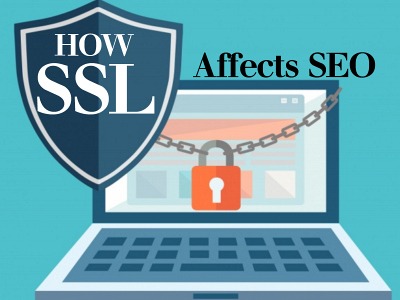How SSL Affects SEONov82017

Google has always been a strong advocate in protecting user personal information. It wasn't a surprise when they announced in 2014 they'd be handing out a small ranking boost within their overall ranking algorithm to HTTPS sites utilizing an SSL Certificate.
Beginning October 2017, Google Chrome now labels HTTP sites as Insecure, warning the connection is not secure. This may cause visitors to click away from your website for fear their personal and location data are not secure.
Studies show:
- Almost 85% of buyers will abandon an online purchase if transaction data is being sent over an insecure connection. Cart abandonment equals lost sales.
- A correlation between HTTPS and higher search placement indexing, with close to 40% of organic page-one Google listings being HTTPS.
- HTTPS sites load faster that HTTP sites, and Google uses load time as an indexing factor.
SEO should be just one reason to switch your website to HTTPS. More importantly, taking the responsibility to move from HTTP to HTTPS will convey to all of your website visitors a secure experience that reflects the responsibility of your business / organization.
What is SSL?
SSL (Secure Sockets Layer) is the standard security technology for establishing an encrypted link between a web server and a browser. This link ensures all data passed between the web server and browsers remain private and secure.
What is an SSL Certificate?
An SSL (Secure Sockets Layer) certificate is a digital certificate that authenticates the identity of a website and encrypts information sent to the server using SSL technology. Encryption is the process of scrambling data into an undecipherable format that can only be returned to a readable format with the proper decryption key.
A certificate serves as an Electronic Passport to establish an online entity's credentials when doing business on the Internet. When an Internet user attempts to send confidential information to a web server, the user's browser accesses the server's digital certificate and establishes a secure connection.
HTTP vs HTTPS
HTTPS (Hyper Text Transfer Protocol Secure) is the secure version of HTTP, the protocol over which data is sent between your browser and the website you are connected to. The 'S' at the end of HTTPS stands for 'Secure'. It means all communications between your browser and the website are encrypted.
Why Utilize HTTPS?
The main benefit of Hypertext Transfer Protocol Secure (HTTPS) is to provide a secure connection to users on web pages where they share personal data.
SSL vs TLS
TLS (Transport Layer Security) and SSL (Secure Sockets Layer) are protocols that provide data encryption and authentication between applications and servers in situations where data is being sent across an insecure network. The terms SSL and TLS are often used interchangeably or in conjunction with each other (SSL/TLS). SSL is the predecessor of TLS, SSL 3.0 served as the basis for TLS 1.0 which is often referred to as SSL 3.1.
How SSL, TLS and HTTPS Work Together
When working in unison, uses encryption algorithms to scramble data in transit, preventing hackers from reading data as it is sent over an internet connection. This information could be anything sensitive or personal including credit card numbers and other financial information, as well as names and addresses.
How Do I Make My Site HTTPS Secure?
If your website is hosted by us (http://hostingct.com), purchase an SSL certificate (https://secure.hostingct.com/knowledgebase/154/How-to-Secure-your-site-with-HTTPS.html) and we’ll process the install.
If your website is hosted elsewhere, you’ll want to determine your hosting provider’s procedure for HTTP to HTTPS conversion.
Recommended Reading
SSL Primer:
https://secure.hostingct.com/knowledgebase/152/SSLorHTTPS-Primer.html
HTTP to HTTPS Best Practices:
https://secure.hostingct.com/knowledgebase/153/HTTP-to-HTTPS-Best-Practices.html




